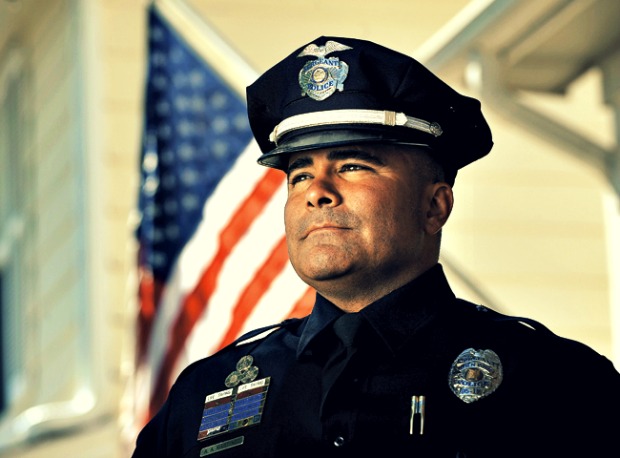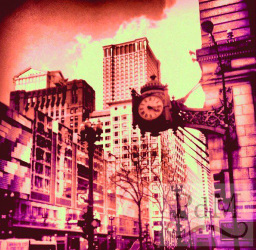
By Chuck del Valle
Society Reporter
September 15 thru October 15 is Hispanic Heritage Month. For some, this is an opportunity to embrace Latino identity and culture - the Spanish-speaking cultures of the U.S., Latin America and, to a certain extent, Spain - to the fullest. For others, it's a vivid reminder of the struggles the largest minority population in the United States still needs to tackle.
According to a poll released last week by the National Hispanic Media Coalition and Latino Decisions, 7 out of every 10 non-Latinos believe that Latinos are gang members, criminals, or affiliated in some way to an illegal activity. Essentially, over seventy percent of non-Latinos believe cholo characters are the norm in the Latino community. However, there is a silver lining: these negative views are malleable.
The NHMC-Latino Decisions poll was part of a larger study that looked at how people viewed Latinos as a result of being exposed to negative/positive representations of Latinos. Non-Latino survey respondents were divided up into groups. One group saw a clip from a popular Hollywood film where tatted-up Latinos and Latinas were devouring beers and harassing the white and black communities. Another group saw a clip from a documentary detailing the life of a current Latino political figure and the struggles he encountered growing up.
The respondents who watched the first clip had more negative views of Latinos along a variety of dimensions—honesty, neighborliness, patriotism, family orientation. On the flip side, respondents who watched positive portrayals of Latinos had less negative views of them. It’s really quite simple; the more Latino criminals and slouches appear on TV, the more negatively Latinos will be viewed. The more Latino astronauts, teachers, and students appear on TV the more positively Latinos will be viewed.
The importance of Hispanic Heritage Month for Ashley Suarez, a Marketing Executive in Long Beach, California, means more than just celebration. "This month year after year hits me like a ton of bricks," Suarez told Le Prestige. "I love being Latina, but part of being who I am means acting in socially-responsible ways where I must act like a role model for my community and those I interact with."
The observation of Hispanic Heritage Month started in 1968 as Hispanic Heritage Week under President Lyndon Johnson and was expanded by President Ronald Reagan in 1988 to cover a 30-day period starting on September 15 and ending on October 15. It was enacted into law on August 17, 1988, on the approval of Public Law 100-402.
Throughout the decades, many Americans of Latino and non-Latino heritage have looked forward to the first couple of weeks of fall, particularly in schools when Latin American ancestry is highlighted. "I’ve always enjoyed seeing fellow Latinos, people who looked and sounded like me, showcased for their professional and personal successes," Miguel Salas, a college senior at Columbia University in New York City stated. "I would be lying if I didn’t admit to also liking the dinners, parties, and get-togethers that are part of this month."
While Hispanic Heritage Month was created to celebrate Latino accomplishments, culture, and identity in the United States, it has developed to encompass the greater issues of the times. Many successful Latinos are using their influence to encourage the larger community, Latino and non-Latino, to stand up for their rights and become citizens that actively-engage in politics.
The findings from the Latino Decisions poll, together with two years of a harsh anti-immigrant media barrage, have jolted Americans. Josue Torres, a 7th grade teacher in Chicago, believes Hispanic Heritage Month is no longer about simply celebrating.
"The realities of the Hispanic community in this country are dire to our nation at large. We shouldn't be content with being the sleeping giant politicians and companies wake up when it's convenient," Torres stated. "We have to get down and dirty and make sure we take our country's decisions, policies, and leaders seriously so as to make well-informed decisions that benefit Americans as a whole - and this definitely includes Latinos."
Hispanic Heritage Month can be used as a springboard to shift popular negative perceptions of Latinos. For many, it may be a vehicle for re-framing who Latinos in the United States are and highlight the vast influence the community has in business, culture, politics, and foreign policy.
Likewise, the focus of Hispanic Heritage Month is not exclusive to Latinos, but rather all Americans. Arnie Madden, a soccer coach in Highland Park, Illinois, discussed the importance of observing this month. "We live in a plural society," Madden mentioned. "We need to be more inclusive in our language and conversations. As a white guy, some people believe that I shouldn't celebrate the different heritage months we have in this country. I disagree completely because our diversity is what makes this country strong, and we need to start realizing that."
Latinos in society, politics, media, and business have often been typecast. While the stereotypes associated with the Hispanic community are not always the best, it serves as a platform for many to seek greater opportunities for themselves and their communities.
Paola Castillo, a grad student at UCLA, believes that stereotypes are reflective of reality but can be overcome. "Yes, Latinos are thought to be the help, the gardeners, and the criminals, but like in any culture, we have successful and productive members of society. The responsibility is on Latinos and the greater community to show this side. While it is a difficult climb to make, these popular characterizations can be changed."
As the Latino Decisions survey itself demonstrated, while there are negative perceptions the presentation of positive characterizations does influence a better opinion on a community. It is a challenge that Americans must encounter, and there is no better time to start engaging than on Hispanic Heritage Month in the eve of the 2012 Presidential Elections.
Society Reporter
September 15 thru October 15 is Hispanic Heritage Month. For some, this is an opportunity to embrace Latino identity and culture - the Spanish-speaking cultures of the U.S., Latin America and, to a certain extent, Spain - to the fullest. For others, it's a vivid reminder of the struggles the largest minority population in the United States still needs to tackle.
According to a poll released last week by the National Hispanic Media Coalition and Latino Decisions, 7 out of every 10 non-Latinos believe that Latinos are gang members, criminals, or affiliated in some way to an illegal activity. Essentially, over seventy percent of non-Latinos believe cholo characters are the norm in the Latino community. However, there is a silver lining: these negative views are malleable.
The NHMC-Latino Decisions poll was part of a larger study that looked at how people viewed Latinos as a result of being exposed to negative/positive representations of Latinos. Non-Latino survey respondents were divided up into groups. One group saw a clip from a popular Hollywood film where tatted-up Latinos and Latinas were devouring beers and harassing the white and black communities. Another group saw a clip from a documentary detailing the life of a current Latino political figure and the struggles he encountered growing up.
The respondents who watched the first clip had more negative views of Latinos along a variety of dimensions—honesty, neighborliness, patriotism, family orientation. On the flip side, respondents who watched positive portrayals of Latinos had less negative views of them. It’s really quite simple; the more Latino criminals and slouches appear on TV, the more negatively Latinos will be viewed. The more Latino astronauts, teachers, and students appear on TV the more positively Latinos will be viewed.
The importance of Hispanic Heritage Month for Ashley Suarez, a Marketing Executive in Long Beach, California, means more than just celebration. "This month year after year hits me like a ton of bricks," Suarez told Le Prestige. "I love being Latina, but part of being who I am means acting in socially-responsible ways where I must act like a role model for my community and those I interact with."
The observation of Hispanic Heritage Month started in 1968 as Hispanic Heritage Week under President Lyndon Johnson and was expanded by President Ronald Reagan in 1988 to cover a 30-day period starting on September 15 and ending on October 15. It was enacted into law on August 17, 1988, on the approval of Public Law 100-402.
Throughout the decades, many Americans of Latino and non-Latino heritage have looked forward to the first couple of weeks of fall, particularly in schools when Latin American ancestry is highlighted. "I’ve always enjoyed seeing fellow Latinos, people who looked and sounded like me, showcased for their professional and personal successes," Miguel Salas, a college senior at Columbia University in New York City stated. "I would be lying if I didn’t admit to also liking the dinners, parties, and get-togethers that are part of this month."
While Hispanic Heritage Month was created to celebrate Latino accomplishments, culture, and identity in the United States, it has developed to encompass the greater issues of the times. Many successful Latinos are using their influence to encourage the larger community, Latino and non-Latino, to stand up for their rights and become citizens that actively-engage in politics.
The findings from the Latino Decisions poll, together with two years of a harsh anti-immigrant media barrage, have jolted Americans. Josue Torres, a 7th grade teacher in Chicago, believes Hispanic Heritage Month is no longer about simply celebrating.
"The realities of the Hispanic community in this country are dire to our nation at large. We shouldn't be content with being the sleeping giant politicians and companies wake up when it's convenient," Torres stated. "We have to get down and dirty and make sure we take our country's decisions, policies, and leaders seriously so as to make well-informed decisions that benefit Americans as a whole - and this definitely includes Latinos."
Hispanic Heritage Month can be used as a springboard to shift popular negative perceptions of Latinos. For many, it may be a vehicle for re-framing who Latinos in the United States are and highlight the vast influence the community has in business, culture, politics, and foreign policy.
Likewise, the focus of Hispanic Heritage Month is not exclusive to Latinos, but rather all Americans. Arnie Madden, a soccer coach in Highland Park, Illinois, discussed the importance of observing this month. "We live in a plural society," Madden mentioned. "We need to be more inclusive in our language and conversations. As a white guy, some people believe that I shouldn't celebrate the different heritage months we have in this country. I disagree completely because our diversity is what makes this country strong, and we need to start realizing that."
Latinos in society, politics, media, and business have often been typecast. While the stereotypes associated with the Hispanic community are not always the best, it serves as a platform for many to seek greater opportunities for themselves and their communities.
Paola Castillo, a grad student at UCLA, believes that stereotypes are reflective of reality but can be overcome. "Yes, Latinos are thought to be the help, the gardeners, and the criminals, but like in any culture, we have successful and productive members of society. The responsibility is on Latinos and the greater community to show this side. While it is a difficult climb to make, these popular characterizations can be changed."
As the Latino Decisions survey itself demonstrated, while there are negative perceptions the presentation of positive characterizations does influence a better opinion on a community. It is a challenge that Americans must encounter, and there is no better time to start engaging than on Hispanic Heritage Month in the eve of the 2012 Presidential Elections.


 RSS Feed
RSS Feed





